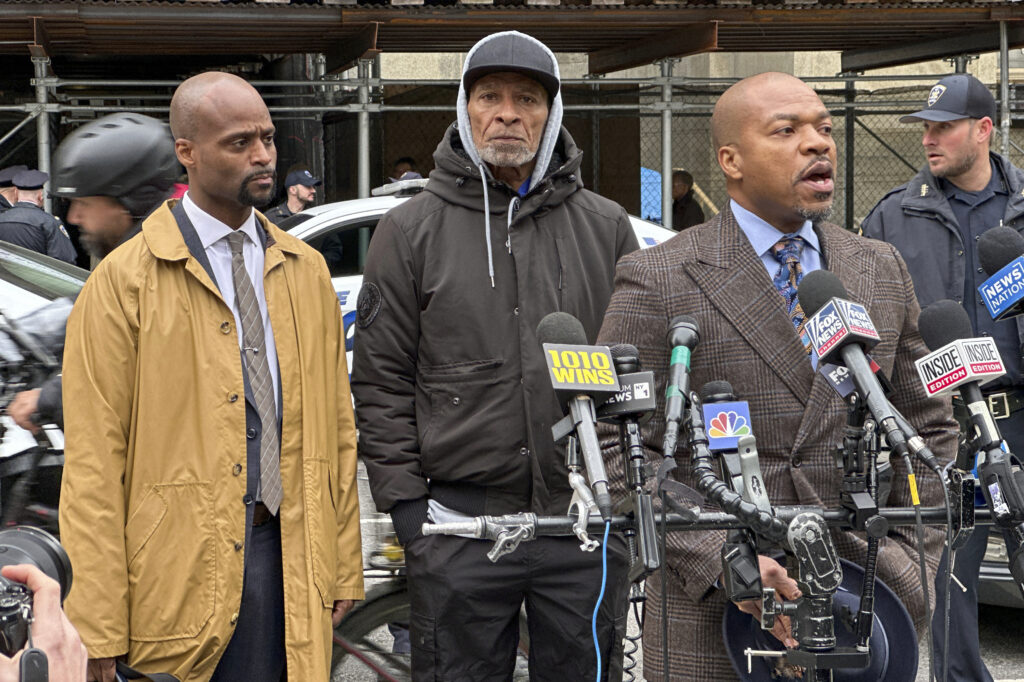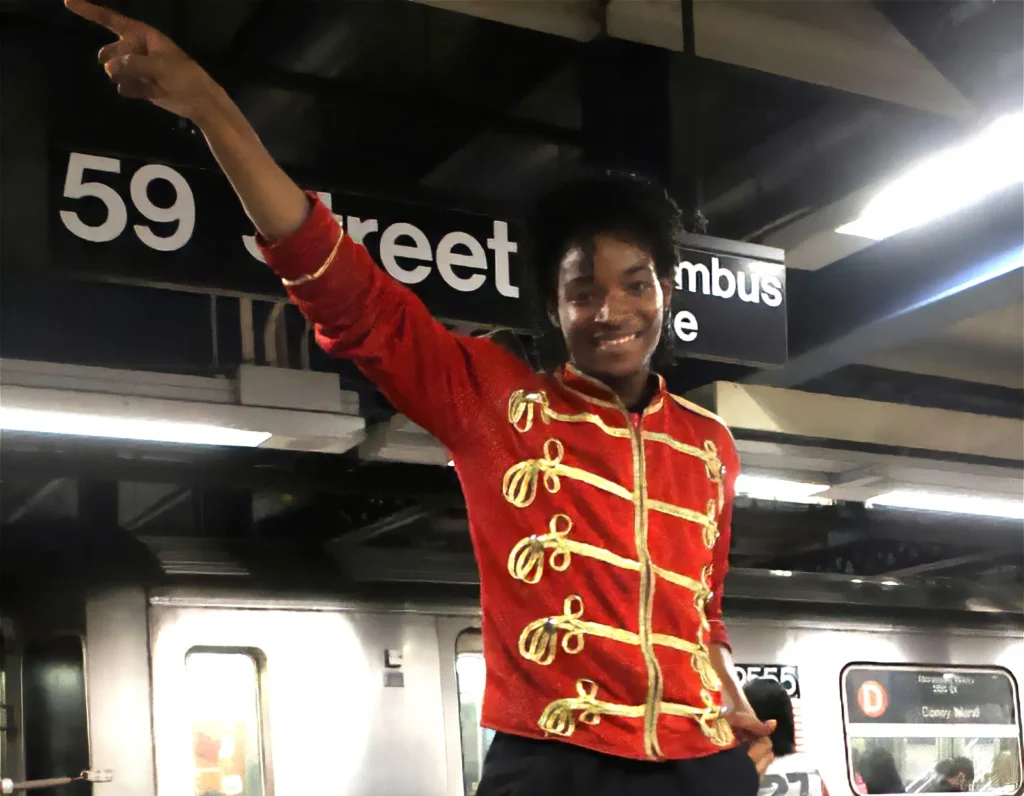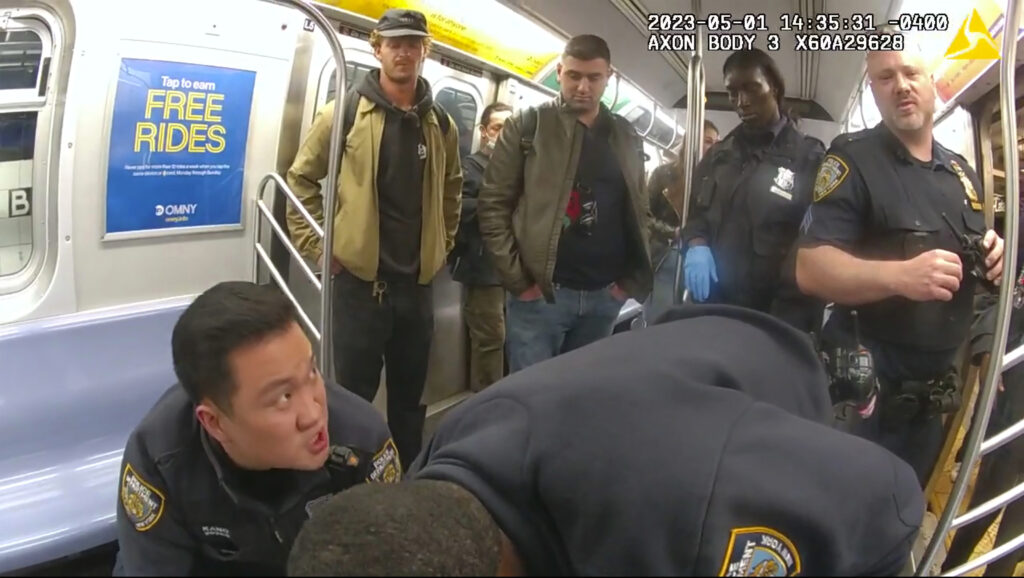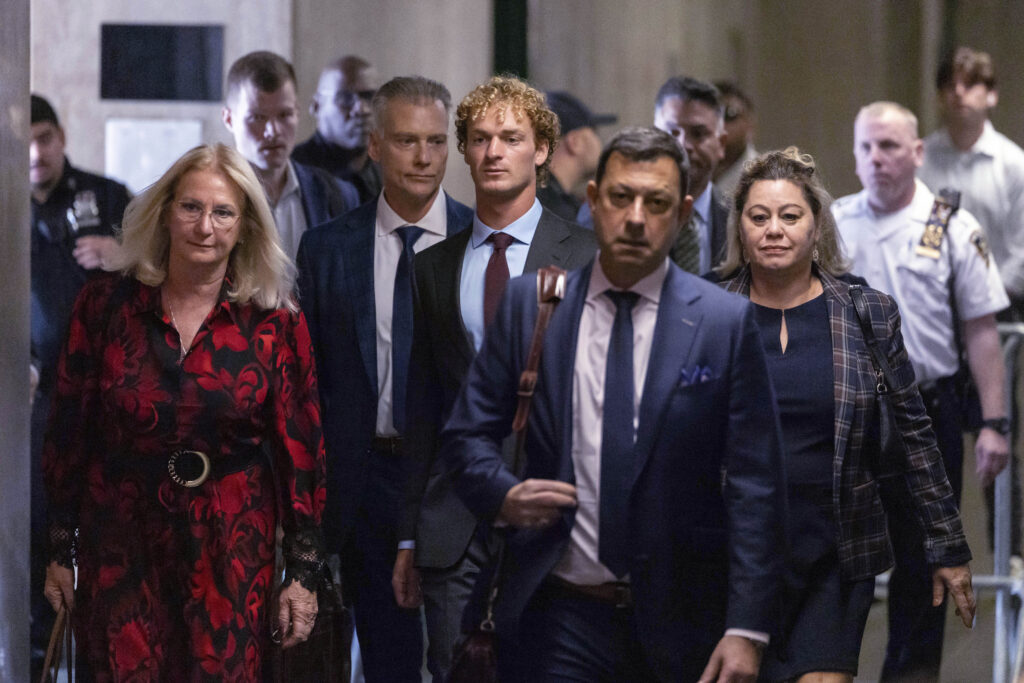‘It’s Just a Political Game’: Daniel Penny Speaks Out After Acquittal, as Jordan Neely’s Father Pushes Forward With Lawsuit Against Him
‘All this attention and limelight,’ Mr. Penny told the Fox News personality Jeanine Pirro, ‘I would prefer (to be) without it.’

The exonerated Marine veteran, Daniel Penny, has given his first interview to Judge Jeanine Pirro following his acquittal in the criminal trial, where he was charged with manslaughter in the death of a homeless Michael Jackson impersonator, Jordan Neely, after placing him in a chokehold on a New York subway last year. Meanwhile, Neely’s father, Andrew Zachery, spoke out about the civil suit he’s filed against Mr. Penny seeking pecuniary relief.
“I am not a confrontational person. I don’t really extend myself. All this,” a shy Mr. Penny told Judge Pirro on Tuesday, “this type of thing is very uncomfortable. All this attention and limelight,” he paused, “is very uncomfortable. I would prefer (to be) without it.”
The full interview will stream on Wednesday Fox Nation, Fox News’ streaming channel. Tuesday evening, Fox News shared a teaser of Mr. Penny’s conversation with Judge Pirro, a television host, author and former judge and district attorney for Westchester County, the prosperous New York City suburb.
Mr. Penny, 26, dressed in a dark suit, appeared suspicious of the cameras around him, saying, “I didn’t want any type of attention or praise. And I still don’t.” He was more reserved than when New York Post reporter, Kyle Schnitzer, tracked him down having a beer with his defense attorneys shortly after a Manhattan jury found him not guilty, at a bar downtown. Photographs taken at the bar show him smiling and relieved. Throughout the trial, Mr. Penny was a cipher– silent, emotionless and clad in trim-fitting suits.

On May 1, 2023, Mr. Penny, who was living in Manhattan’s East Village and studying architecture and engineering at City Tech, was on his way to the gym, when the street performer, Neely, boarded the northbound F train. Neely, who was 30 years old and homeless at the time, began acting aggressively, tossing his jacket to the floor, shouting that he was hungry, thirsty, ready to go to prison and ready to die. Mr. Penny told Judge Pirro that Neely “was just threatening to kill people. He was threatening to go to jail forever, go to jail for the rest of his life.”
Eye-witnesses who testified during the seven week-long trial, all agreed that Neely’s behavior was menacing, though only two women said he threatened to kill. Neely did not physically attack anyone, and did not carry a weapon. But the tone of his voice, witnesses agreed, was extremely frightening. Mr. Penny, who was standing close to him in the moving subway car, grabbed Neely from behind, placed him in a chokehold and brought him to the floor of the car. After the train arrived at the next station and the doors had opened, Mr. Penny kept Neely in the chokehold for about six minutes, lying on the floor with Neely, locked in a macabre embrace. Two other men helped Mr. Penny restrain Neely. When the police arrived, Neely was unresponsive. He was pronounced dead at the hospital.
Prosecutors argued that Mr. Penny acted recklessly, because he held Neely too long, and having trained in the Marines, he should have known that chokeholds can be fatal. But Mr. Penny told Judge Pirro that he did not feel safe letting Neely go, because he was “in a vulnerable position” lying on his back, on the floor with what he perceived to be a dangerous man.
“If I just let him go, now I am on my back, and he could just turn around, and start,” Mr. Penny said to Judge Pirro, pausing here, seemingly looking for the right words to express his fear, “doing what he said– to me…”

“Killing?” Judge Pirro interrupted.
“Killing, hurting,” Mr. Penny answered, visibly scared.
Mr. Penny said he did not feel safe, letting go of Neely, even though other passengers were around him, and one woman even said that he should let him go, he may kill him. And one of the men, who was attempted to help in the restrain, testified that he assured Mr. Penny, he could let him go.
“The guilt I would have felt,” Mr. Penny told Judge Pirro, “if someone did get hurt, if he (Neely) did what he was threatening to do, I would never be able to live with myself. And I’ll take a million court appearances, people calling me names, and people hating me, just to keep one of those people from getting hurt or killed.”

The high-profile case polarized the public. Supporters for Mr. Penny raised over three million dollars in an online campaign. Vivek Ramaswamy donated $10,000. Meanwhile, supporters for Neely demanded retribution. During the seven week-long trial, Black Lives Matter activists and other protesters, including activists from the Rev. Al Sharpton’s National Action Network, gathered outside the Manhattan criminal courthouse. Some protesters yelled insults at Mr. Penny as he and his defense attorneys, and their security detail, walked up the steps to attend the proceedings.
In an interview with the defense attorneys, Steven Raiser and Thomas Kenniff, Fox News played a clip of a pro-Neely protester, standing behind a metal barricade on Monday, yelling through a megaphone, “Daniel Penny, wherever you are today, you’re put on notice. You’re not welcome in New York. You’re not allowed to walk these streets. We control them, not the NYPD. Not your security. This is our town, you’re not safe here, homie. Pack your shit and get out of town.”
In the courtroom, immediately after the verdict, Hawk Newsome, a co-founder of the New York chapter of Black Lives Matter, taunted Mr. Penny, threatening him that, “It’s a small world, buddy.”
Mr. Raiser called it “threatening behavior”, noting that people have been arrested for “this kind of violent threats against somebody individually.”

“But the truth is Danny is gonna walk these streets and he’s gonna do so proudly because a jury of his peers just vindicated him.” Mr. Raiser told the Fox News personality conducting the interview, Martha MacCallum.
When Ms. MacCallum asked, what Mr. Penny would do now, Mr. Kenniff said, “hopefully take a nice long vacation, I think he needs it.” And his partner, Mr. Raiser added, “that’s what we recommend.”
“I just wanted to mention too that this is a huge burden lifted from his shoulders, for sure, but there are scars that will remain here,” Mr. Raiser explained. “Danny, really for the rest of his life, will be kinda looking over his shoulders a little bit.” However, saying that Mr. Penny wants to move forward with his life, the attorney said that he would “finish his architectural degree and he’s gonna do great.”
Mr. Kenniff assured Ms. MacCallum that his team would “push back with equal vigor” against the looming civil lawsuit that Neely’s father, Andre Zachery, recently filed in civil court as they had fought the criminal charges.

Speaking to ABC News’ Linsey Davis, Mr. Zachery and his attorney, Donte Mills, addressed the lawsuit and their take on the verdict.
“It hurt me,” Mr. Zachery said. “I just didn’t know what to say at the time. It hurt me to my core. To hear something like that. It should be no surprise. But here we are.”
Ms. Davis asked about the comment Mr. Zachery made on the day of the verdict to reporters outside the courthouse, when he called the system “rigged.”
“What do you mean by that? Racially?” Ms. Davis asked.

“It could be in many ways,” Mr. Zachery answered, “different ways.”
“This isn’t a black and white issue,” his attorney, Mr. Mills, clarified. “This is about everybody mattering. There’s some people who look at this and say, Jordan was houseless. He had mental issues, almost as if he deserved this to happen to him. And there’s no qualms. We all have problems.”
According to various media reports, Neely and his father were estranged at the time of his death, and Neely was homeless. Neely’s mother was murdered in 2007 by her boyfriend, who stuffed her body in a suitcase and left it by the Henry Hudson Parkway. Neely did not move in with his father until he was 18 years old
New York Magazine reported that Mr. Zachery and Neely would argue, because the father would ask the son to share the money he earned doing

Michael Jackson impersonations on the street, sometimes even with a dance group on Times Square. When Neely would refuse to give his father money, a friend said, Mr. Zachary would take away his son’s keys. Mr. Zachary, who is seeking monetary damages from Mr. Penny, denied these reports to New York Magazine.
Medical records presented during the trial showed that Neely was diagnosed with schizophrenia, and had been abusing the drug K2 for years. The synthetic cannabinoid can cause psychosis and trigger aggressive behavior. He also had a record of 42 criminal arrests, including for striking women at random and indecent exposure
“And even with Andre, there were times where he could have been there more for Jordan. That’s understandable.” Mr. Mills said, referring to Neely’s father. “But that doesn’t mean that Jordan deserved what happened to him, or that you can simply choke someone to death and not be held responsible for it. That’s what we want people to understand.”
“This isn’t a white or Black thing. This is all of us. We all have that right to voice when we’re feeling something to be heard and for someone to be held accountable if they harm us when they shouldn’t,” Mr. Mills said.

Mr. Penny would agree that the issue is not about race. Last year, after Mr. Penny was charged with second-degree manslaughter and criminally negligent homicide, he told the New York Post, “This had nothing to do with race.”
“I’m not a white supremacist,” he said. “I mean, it’s, it’s a little bit comical. Everybody who’s ever met me can tell you, I love all people, I love all cultures. You can tell by my past and all my travels and adventures around the world. I was actually planning a road trip through Africa before this happened.”
Mr. Mills said that he and Mr.Zachery waited before they filed their lawsuit, to “see what the evidence was… what the defense was going to be. And when we heard in court all of the evidence that when the incident was over… whether or not Daniel Penny was right in acting to begin with… the entire incident was over in thirty seconds, everybody was off the train, and Daniel Penny continued to choke him for up to six minutes, when people were saying, let him go, you’re gonna kill him. We have his hands, let his neck go, you’re gonna kill him. Once we heard all of that, that’s when we began the civil process and filed that lawsuit.”
In other cases, such as in the trial against Bernhard Goetz, who shot four youths on a New York subway in 1984, after they allegedly tried to rob him, the defendant was acquitted in criminal court, but then held liable in his civil trial. Or the NFL star O.J. Simpson, who was found not guilty of murdering his wife Nicole Brown Simpson and her friend Ronald Godlman in 1994, was later ordered to pay $33 million to the families by a jury in civil court.

The burden of proof is lower in civil court; the plaintiff must show that a “preponderance of the evidence,” meaning that it is more likely than not that the defendant is responsible, while in criminal court the prosecution needs to prove their cases beyond a reasonable doubt.
“It’s gonna take some time. It could be a year or two,” Mr. Mills said during his interview. “We’re not in rebellion right now. We’re following the rules of our legal system. If you think somebody killed someone and they should not have, we have the right to file a wrongful death suit. That’s what we did.”
When Ms. Davis, on her digital program “ABC News Live”, asked Mr. Zachery what he would say to Mr. Penny, if he could talk to him directly, he answered, “Why you didn’t say, you were sorry, man. Come on, man. Why you didn’t say nothing?”
“Would that have mattered?” Ms. Davis pressed.

“Sure would have,” Mr. Zachery replied.
But Mr. Penny echoed in his interview with Judge Pirro what his attorney said in his closing arguments: that the system was to blame. During the Covid-19 pandemic the situation with mentally ill homeless people in the New York subway system worsened significantly. Much as the acquittal of Mr. Goetz in 1987 was viewed as a referendum on crime in the subways, Mr. Penny’s case echoed what New York subway riders encounter every day.
“This case is about a broken system,” Mr. Raiser argued in front of the jury. “The broken system that does not help our mentally ill or unhoused. It’s that broken system that led us here… It was over seven minutes for the police to arrive after the 911 call… The government is scapegoating the one man who was willing to stand up at the moment he was needed.”
Mr. Penny called it “just a political game.” He said, “I don’t mean to get political. I don’t really want to make any enemies, really. Although I guess, I have already. But these are their policies that have clearly not worked, that the people, the general population are not in support of, yet their egos are too big just to admit that they’re wrong.”

The civil lawsuit was filed on December 4 during Mr. Penny’s criminal trial. The complaint seeks monetary damages, though the exact amount was not specified.
A judge, New York criminal court judge, George Grasso, who had attended the case with the public, and watched the attorneys argue from the pews, said to the Sun in the hallway that day.
“Of course, there’s a lawsuit – it’s New York.”
__________
Correction: Donte Mills is the name of the lawyer representing Andre Zachery. An earlier edition misstated Mr. Mills’s first name.

